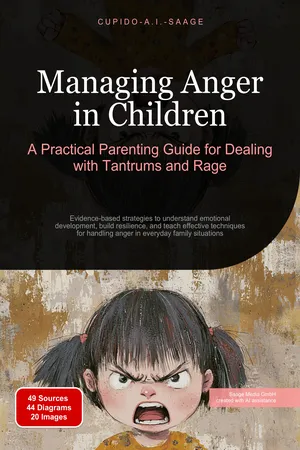
Managing Anger in Children
A Practical Parenting Guide for Dealing with Tantrums and Rage
- English
- ePUB (mobile friendly)
- Available on iOS & Android
Managing Anger in Children
A Practical Parenting Guide for Dealing with Tantrums and Rage
About this book
In 'Managing Anger in Children: A Practical Parenting Guide for Dealing with Tantrums and Rage, ' parents will discover a comprehensive approach to understanding and addressing one of childhood's most challenging emotions.
This evidence-based guide explores the developmental psychology behind children's emotional growth, explaining how anger manifests differently across various ages and stages. Through detailed neurobiological insights, parents will gain clarity on why tantrums occur and how a child's developing brain processes intense emotions.
The book offers practical strategies for identifying common anger triggers in daily family life, from overwhelming situations to unmet needs and autonomy struggles. Parents will learn to recognize different expressions of anger—from explosive outbursts to quiet resistance—and respond appropriately to each.
A significant portion focuses on parental self-reflection, helping adults recognize their own anger patterns and emotional modeling. The guide emphasizes that effective management of children's anger begins with parents understanding their own emotional responses.
Readers will find actionable communication techniques for dealing with anger and rage in the moment, including active listening methods and de-escalation approaches tailored to different age groups. The book provides strategies for creating preventive measures through daily routines, rituals, and environmental adjustments that reduce tantrum triggers.
Practical chapters cover body-based calming techniques, creative expression outlets, and structured approaches to tantrum management. Parents will discover how to create safe cool-down spaces and effectively process emotional episodes after they occur.
The parenting guide also addresses building resilience and frustration tolerance, offering methods to help children develop emotional regulation skills through everyday experiences. Clear guidance on setting boundaries, implementing appropriate consequences, and fostering social competencies completes this practical resource.
For parents facing particularly intense emotional responses or persistent difficulties, the book includes sections on supporting highly sensitive children and knowing when to seek professional assistance.
Written with compassion and practical wisdom, this guide equips parents with the tools to transform challenging moments into opportunities for emotional growth and stronger family connections.
Frequently asked questions
- Essential is ideal for learners and professionals who enjoy exploring a wide range of subjects. Access the Essential Library with 800,000+ trusted titles and best-sellers across business, personal growth, and the humanities. Includes unlimited reading time and Standard Read Aloud voice.
- Complete: Perfect for advanced learners and researchers needing full, unrestricted access. Unlock 1.4M+ books across hundreds of subjects, including academic and specialized titles. The Complete Plan also includes advanced features like Premium Read Aloud and Research Assistant.
Please note we cannot support devices running on iOS 13 and Android 7 or earlier. Learn more about using the app.
Information
Table of contents
- 1. Fundamentals of Anger Management in Children
- 1. 1 Developmental Psychological Aspects
- Emotional developmental stages in childhood
- Neurobiological basis of childhood anger
- 1. 2 Forms of Childhood Anger Expression
- Physical expressions during tantrums
- Verbal expressions during strong emotions
- Passive forms of resistance and silent anger
- 1. 3 Understanding Triggers for Childhood Anger
- Overwhelming situations in everyday life
- Striving for autonomy and testing boundaries
- Unmet needs as a source of anger
- 2. Parents' Guide to Dealing with Anger
- 2. 1 Self-Reflection for Parents
- Recognizing one's own anger patterns
- Acting as an emotional role model
- Respecting personal limits
- 2. 2 Communication Strategies during Tantrums
- Active listening in conflict situations
- De-escalation techniques
- Teaching age-appropriate emotional language
- 2. 3 Preventive Measures in Family Life
- Establishing structured daily routines
- Creating predictability through rituals
- Avoiding overstimulation
- 3. Practical Methods for Anger Management
- 3. 1 Body-Oriented Calming Techniques
- Breathing exercises for different age groups
- Movement activities for tension release
- Relaxation methods for family life
- 3. 2 Creative Ways to Express Emotions
- Painting and drawing as an emotional outlet
- Role-playing for emotional processing
- Stories and metaphors as a reflection aid
- 3. 3 Structured Support for Tantrums
- Creating safe spaces
- Time limits for outbursts
- Debriefing after anger situations
- 4. Dealing with Frustration in Child Rearing
- 4. 1 Promoting Resilience in Everyday Life
- Gradually building frustration tolerance
- Supporting experiences of success and failure
- Strengthening self-efficacy through problem-solving
- 4. 2 Setting Boundaries and Consequences
- Developing and communicating clear rules
- Consistent action in case of transgressions
- Finding needs-oriented compromises
- 4. 3 Promoting Social Skills
- Supporting conflicts with peers
- Developing empathy
- Supporting cooperative behavior
- 5. Special Challenges in Dealing with Anger and Rage
- 5. 1 Intense Emotionality in Children
- Understanding highly sensitive children
- Dealing with particularly intense outbursts of anger
- Recognizing and limiting emotional flooding
- 5. 2 Anger in Different Contexts
- Anger management in educational institutions
- Dealing with anger in sibling rivalry
- Emotion regulation in public situations
- 5. 3 Professional Support Options
- Indications for external help
- Family counseling and parent coaching
- Therapeutic approaches for persistent difficulties
- Sources
- Image Sources